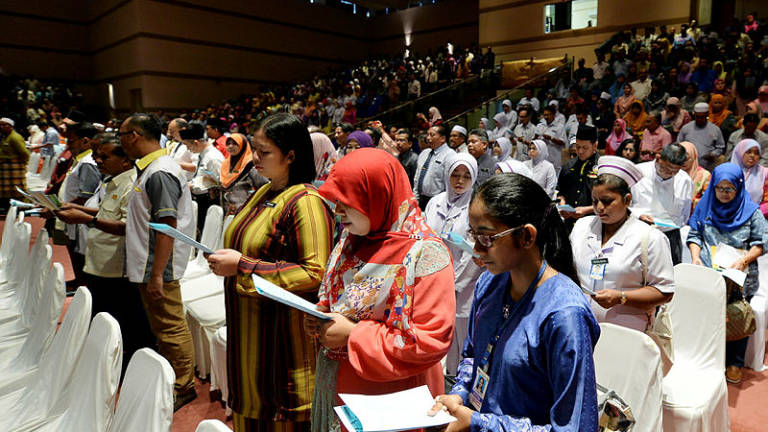ONE of the government’s biggest financial headaches is the exponential wage bill of the civil service, which costs around RM8 billion at least monthly.
And by the same token, another close to RM2 billion to pay the pensioners.
These are statutory payments which, to the great credit of the prudent financial management of the Treasury, there have never even been cases of civil servants and pensioners getting their salaries late or deferred as we often hear in the private sector, especially during these past months when the economy is battered by the Covid-19 pandemic.
In fact, civil servants and pensioners get their dues earlier than those in the private sector and even well before the month-end for festive seasons like Hari Raya, Chinese New Year, Deepavali and Christmas.
Amid massive job cuts, private sector employees are also forced to take home reduced salary or go on unpaid leave to sustain operations while many have closed shop. Civil servants and pensioners are an envied lot.
They are very much in their comfort zones with job security until their retirement age, which has been increased a number of times from the original 55 to 56, then to 58 and finally 60.
I once spoke to a former finance minister and he admitted to me that his biggest headache while heading this key ministry was to ensure enough money to pay the civil servants and pensioners on time.
The Malaysian civil service has often been described as bloated with a total manpower strength of over 1.6 million. There are some 850,000 retirees enjoying life-long pensions.
Internally, politicians, activists or NGOs avoid talking negatively about the civil service. This is quite understandable, especially for politicians, as the civil service is a massive vote bank, which explains why they are pampered with bonuses ahead of a general election.
And although most civil servants stayed at home for at least two months during the various stages of the movement control order to contain the pandemic before more offices were opened for normal service, they and the pensioners, too, were not left out of the special payments under the Covid-19 economic stimulus package. But it took the World Bank to come out with a report last year which gave poor marks for our civil service.
Of utmost concern to the World Bank was the sustainability of the public sector’s wage bill.
It noted there had been a decline in the performance of the civil service and ranked Malaysia lowly in terms of accountability, impartiality and openness of the public sector.
About the only internal whistle-blowing on the civil service would come from the auditor-general’s (AG) report, which consistently red-flags instances of leakages and financial mismanagement in the implementation of projects, particularly in procurements.
Despite the AG Department doing a lot of work on strengthening the check and balance mechanisms, its next report would invariably come out with more of such instances giving the impression that not much was done to plug the loopholes of effective action taken against those responsible for them.
Some years after his retirement, former auditor-general Tan Sri Ambrin Buang was still concerned about government procurements.
He told me that at the pre-award stage, there must be an honest and not a superficial due diligence to establish the actual financial and technical capacity of bidders based on a good financial and technical track record.
This will reduce much of the risks of project failure, or selling the project to others for a commission.
In addition, he said that for large projects in which a value management lab was mandatory, there should not be any exemption to the lab requirement and its recommendations.
“Because this lab is giving an independent evaluation of the scope, cost, design and other related matters of the project so as to optimise the value of money concept and to protect government interest,” added Ambrin.
It is therefore imperative for government officers to practise honest due diligence and strictly comply with government policies and regulations.
According to World Bank, there is a big gap in the performance of our civil servants compared with the Organisation for Economic Cooperation and Development countries.
The bank makes this comparison with these developed nations because Malaysia is hoping to move from a middle-income to a high-income nation.
More important than the question of size is the quality of service and sustainability of the wage bill.
Salaries and pensions for civil servants account for 44% of the government’s operating budget and it’s not far-fetched to say this is arguably the highest compared with other countries.
The World Bank also noted a country that could collect more revenue could afford to finance its growing civil service but in Malaysia’s case, revenue collection had been a “big problem”.
“It has not moved in the way it should move and if you are not collecting revenue that you should be collecting and the wage bill is rising, the situation is not sustainable,” added the bank.
The national coffers in the coming year or two are expected to shrink as countries struggle to recover from the pandemic and in our case, it’s aggravated by the drop in oil price with oil being our main source of revenue.
I have not, since the bank released this report in August last year, read any comments from the government side or the head of the civil service on the action plan to be taken following the World Bank’s report, but perhaps it’s time to consider civil service reforms.
Mind you, the report was prepared well before the Covid-19 virus virtually brought the entire world down to its knees, with more than 440,000 deaths, putting countless other millions out of jobs and tens of trillions in losses worldwide.
Granted that because of the nature of the civil service, it’s not quite possible to trim its size to reduce operating costs. In fact, costs keep rising phenomenally with the annual increment of salaries and other related expenditures.
The government previously had even devised a small increment for pensioners as well and this, too, actually costs a lot of money.
If the leadership of the civil service were to think out of the box, a lot could be done by way of cost savings.
Perhaps we need to organise a contest where members of the public could chip in ideas on civil service reforms with a view to improving the quality and trimming down expenditures.
One change that could be effected in the civil service is the thinking that administrative and diplomatic officers, or better known as PTD, must have the highest grades in ministries.
It’s fine for secretaries-general of ministries to be well paid, but this doesn’t mean the professionals and scientists, for instance, must be lower grades than the PTD.
The concept that the PTD are masters and the professionals are lower status is old fashioned and actually a legacy of the colonial era where the British officers then were the rulers of the country.
Our PTD must realise the world has changed and so must the salary grades of the professionals because they are our assets.
They will decide our economic progress that earns revenue and not the pen-pushing civil servants.
On this score, a former Treasury secretary-general and founder of the Group of 25 ex-top civil servants (G25), Tan Sri Mohd Sheriff Kassim, said it’s time to change the old mentality still prevailing in the civil service.
He recalled what his history lecturer, Prof Wang Gungwu taught him at the University of Malaya way back in 1960 in which Confucian culture put the learned on a higher level of respect than the mandarins at the royal palace.
We are fast entering the era of new normal post-Covid-19 and the civil service, too, must adapt to the harsh new realities. The comfort zones might no longer be sustainable.
Comments: letters@thesundaily.com















